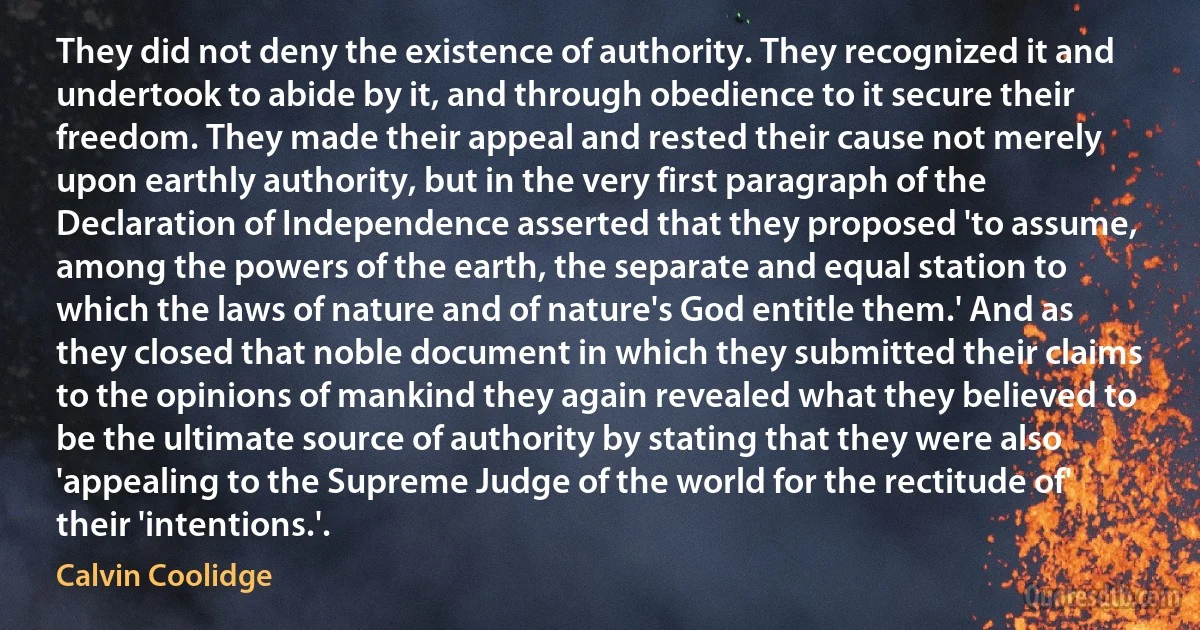
They did not deny the existence of authority. They recognized it and undertook to abide by it, and through obedience to it secure their freedom. They made their appeal and rested their cause not merely upon earthly authority, but in the very first paragraph of the Declaration of Independence asserted that they proposed 'to assume, among the powers of the earth, the separate and equal station to which the laws of nature and of nature's God entitle them.' And as they closed that noble document in which they submitted their claims to the opinions of mankind they again revealed what they believed to be the ultimate source of authority by stating that they were also 'appealing to the Supreme Judge of the world for the rectitude of' their 'intentions.'.
Calvin CoolidgeRelated topics
authority cause declaration document earth equal freedom judge nature noble paragraph rectitude source stating ultimate world lawsRelated quotes
The older I grow the more I distrust the familiar doctrine that age brings wisdom. . . . Certainly it would be difficult to imagine any committee of relatively young men, of thirty or thirty-five, showing the unbroken childishness, ignorance and lack of humor of the Supreme Court of the United States. The average age of the learned justices must be well beyond sixty, and all of them are supposed to be of finished and mellowed sagacity. Yet their knowledge of the most ordinary principles of justice often turns out to be extremely meager, and when they spread themselves grandly upon a great case their reasoning powers are usually found to be precisely equal to those of a respectable Pullman conductor.

H. L. Mencken
The Secure Fence Act is part of our efforts to reform our immigration system. We have more to do. Meaningful immigration reforms means that we must enforce our immigration laws in the United States. It is against the law to hire someone who is here illegally. We fully understand that most businesses want to obey that law, but they cannot verify the legal status of their employees because of widespread document fraud. So we're creating a better system for verifying documents and work eligibility, and in the meantime, holding people to account for breaking the law. We must reduce pressure on our border by creating a temporary worker plan. Willing workers ought to be matched with willing employers to do jobs Americans are not doing for a temporary -- on a temporary basis.

George W. Bush
Let us not despair; it is a blessed cause, and success, ere long, will crown our exertions. Already we have gained one victory; we have obtained, for these poor creatures, the recognition of their human nature, which, for a while was most shamefully denied. This is the first fruits of our efforts; let us persevere and our triumph will be complete. Never, never will we desist till we have wiped away this scandal from the Christian name, released ourselves from the load of guilt, under which we at present labour, and extinguished every trace of this bloody traffic, of which our posterity, looking back to the history of these enlightened times, will scarce believe that it has been suffered to exist so long a disgrace and dishonour to this country.

William Wilberforce
It is the subtle scheme of political propaganda to describe the Hindu as pro-Fascist. It is a cruel calumny which has been spread in America and other countries. The Hindu Mahasabha stood for Savarkar's policy of militarization and industrialization. We recognized that Fascism was a supreme menace to what is good and noble in our civilization. Due to Veer Savarkar's call thousands of young men joined the Army and Navy and Air Force and shed their blood for resisting Nazi tyranny and for real friendship with China and Russia. But as the Hindus had the temerity to ask for National Independence and took the lead in rejecting the Cripps offer, they were maligned and the subtle forces of organized British propaganda were let loose to blackmail the Hindus.

Nirmal Chandra Chatterjee
Spinoza, then, emerged as the supreme philosophical bogeyman of Early Enlightenment Europe. Admittedly, historians have rarely emphasized this. It has been much more common, and still is, to claim that Spinoza was rarely understood and had very little influence, a typical example of an abiding historiographical refrain which appears to be totally untrue but nevertheless, since the nineteenth century, has exerted an enduring appeal for all manner of scholars. In fact, no one else during the century 1650–1750 remotely rivalled Spinoza's notoriety as the chief challenger of the fundamentals of revealed religion, received ideas, tradition, morality, and what was everywhere regarded, in absolutist and non-absolutist states alike, as divinely constituted political authority.

Baruch Spinoza
